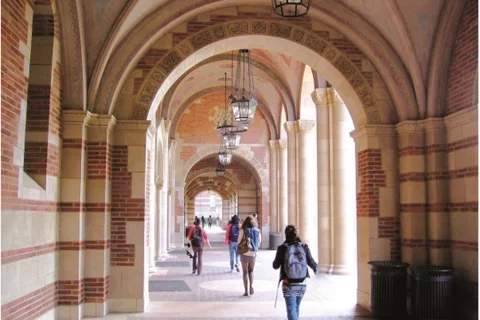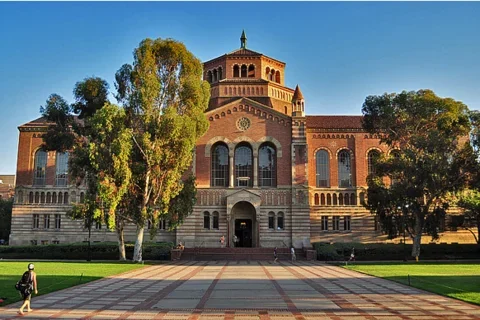Research Resources
Library Resources

UCLA Life Sciences Research
Life Sciences Research
UCLA's Library
UCLA Library
Bio Medical Library
Bio Medical LibraryStreamline Your Research
Maximize your research potential by harnessing the resources and support services provided to trainees. By utilizing these valuable assets, you can enhance efficiency, address any challenges that arise, and tap into the expertise of seasoned professional.
Access the Tools You Need to Propel Your Cancer Research
These invaluable assets will assist you in planning, executing, and disseminating your work with enhanced effectiveness and efficiency. Explore the vast array of available resources, such as online databases, libraries, and scientific literature, to access essential research materials and datasets. Additionally, leverage funding opportunities, research infrastructure, and professional organizations and societies to propel your work forward. Recognize that resources have a pivotal role in shaping the direction and impact of research, and seize the opportunity to maximize their potential to advance your endeavors.
Access the Tools You Need to Propel Your Cancer Research
These invaluable assets will assist you in planning, executing, and disseminating your work with enhanced effectiveness and efficiency. Explore the vast array of available resources, such as online databases, libraries, and scientific literature, to access essential research materials and datasets. Additionally, leverage funding opportunities, research infrastructure, and professional organizations and societies to propel your work forward. Recognize that resources have a pivotal role in shaping the direction and impact of research, and seize the opportunity to maximize their potential to advance your endeavors.
Access the Tools You Need to Propel Your Cancer Research
These invaluable assets will assist you in planning, executing, and disseminating your work with enhanced effectiveness and efficiency. Explore the vast array of available resources, such as online databases, libraries, and scientific literature, to access essential research materials and datasets. Additionally, leverage funding opportunities, research infrastructure, and professional organizations and societies to propel your work forward. Recognize that resources have a pivotal role in shaping the direction and impact of research, and seize the opportunity to maximize their potential to advance your endeavors.
Access the Tools You Need to Propel Your Cancer Research
These invaluable assets will assist you in planning, executing, and disseminating your work with enhanced effectiveness and efficiency. Explore the vast array of available resources, such as online databases, libraries, and scientific literature, to access essential research materials and datasets. Additionally, leverage funding opportunities, research infrastructure, and professional organizations and societies to propel your work forward. Recognize that resources have a pivotal role in shaping the direction and impact of research, and seize the opportunity to maximize their potential to advance your endeavors.
Mentor Training Programs
Graduate Student Mentor Training
Graduate student mentorship training is a program designed to help graduate students develop the skills and knowledge necessary to effectively mentor and support the academic and professional development of undergraduate and/or other graduate students.
Postdoc Mentor Training
A postdoctoral student mentorship training program is a professional development opportunity designed to equip postdoctoral researchers with the skills and knowledge needed to effectively mentor and guide the next generation of scientists. The objective of the workshop is to enrich current mentoring practices by providing mentors with evidence-based approaches to research mentoring while offering a forum in which to solve dilemmas.
Faculty Mentor Training
Faculty mentor training is a professional development opportunity designed to help professors and instructors become effective and supportive mentors for their students, colleagues, and other mentees. The topics covered during the workshop included: Aligning Expectations, Maintaining Effective Communication, Assessing Understanding, Fostering Independence, and Promoting Professional Development.
Finding a Mentor and Research Project
Getting involved in research! The Undergraduate Research Center provides resources to help students obtain research positions.
Research Opportunities
You can find opportunities to do research on and off campus in all disciplines through the Undergraduate Research Portal
College Academic Mentors
College Academic Mentors are UCLA graduate students who have been specially trained to help you with program planning, and course selection, and to give you guidance in the process of choosing a major and planning for graduate and/or professional school.
Teaching Support of Graduate Students and Postdoc
The Center for the Advancement of Teaching provides teaching support to graduate students through a variety of programs and resources, including workshops, fellowship opportunities, teaching guides, and more. Click on one of the blocks below to learn more.
Presenting Your Research
Presentations
Presenting your research is a culmination of the process of scientific discovery. Being able to clearly communicate your research to both general and scientific audiences is a key skill to develop. Below are some links to materials about poster presentations and oral presentations.
Poster Guidelines
Trainee poster guidelines are a set of rules and instructions that guide how to design and present a poster as part of a training program or conference. This guide provides information, template resources, and tutorials on creating posters for conference presentations.
Poster Template
UCLA Poster template is a pre-designed format/ layout that can be used as a starting point for creating a poster as part of a training program or conference. The template can help ensure that the poster meets the necessary size, format, and content requirements and provides a consistent look and feel for all posters presented as part of the program or conference.
Examples of Effective Posters
Examples of posters with the perfect balance of color and graphic design. We hope they will inspire you to create a great-looking poster.
Poster Workshops
Workshops include cornerstone research workshop series, research methods workshops, scholarship info sessions, and undergraduate research week workshops and info sessions.
Trainee Support
Applying for Graduate School and Fellowship
General information and planning for graduate school. Graduate research fellowships and fellowship directories
Trainee Mistreatment
Please select from the following the trainee for which you are reporting an incident of experienced mistreatment.
QCB Collaboratory Workshops
The QCB Collaboratory workshops are open and free of charge to UCLA faculty, staff, affiliates, and students.
CV vs. Resume
Materials for careers in the cancer industry, CV and Resume comparison.
Support Offices
Undergraduate Research Center
The Undergraduate Research Center Sciences services for UCLA undergraduates and faculty in all areas of the life and physical sciences, engineering, and mathematics. There primary mission is to promote, develop, and celebrate undergraduate student research with the overall goal of enhancing undergraduate education and preparing students.
Graduate Student Resource Center
The Graduate Student Resource Center (GSRC) works to understand graduate and professional student needs, to connect graduate and professional students to resources and services, and to advocate for their well-being and success.
UCLA Postdoctoral Scholars
The Office of Bioscience Postdoctoral Affairs serves postdoctoral scholars in the David Geffen School of Medicine and biosciences-affiliated disciplines throughout UCLA. They provide resources and training for bio-scientists, including professional development, fellowship writing, wellness and resiliency, teaching, and ethics and responsible conduct of research.
JCCC Office of Cancer Training & Education
The Office of Cancer Training and Education has three primary objectives; To identify, integrate, and support existing cancer-relevant education and training activities; To create and coordinate new cancer education, career development, and mentorship programs and activities; and to engage trainees from underrepresented groups and support their cancer career development.